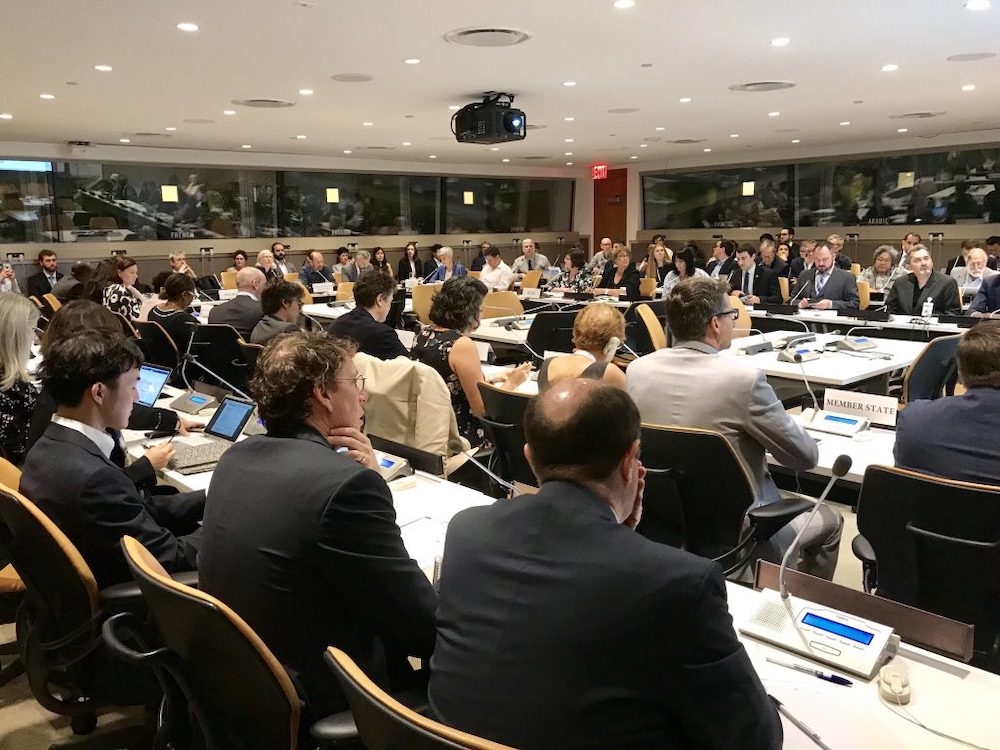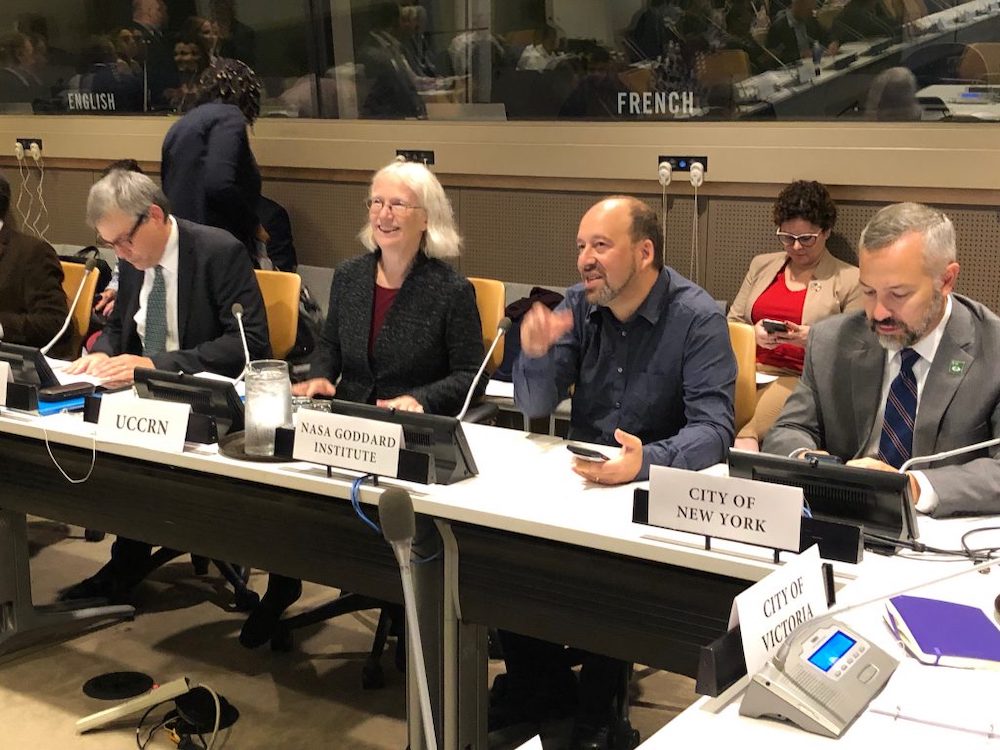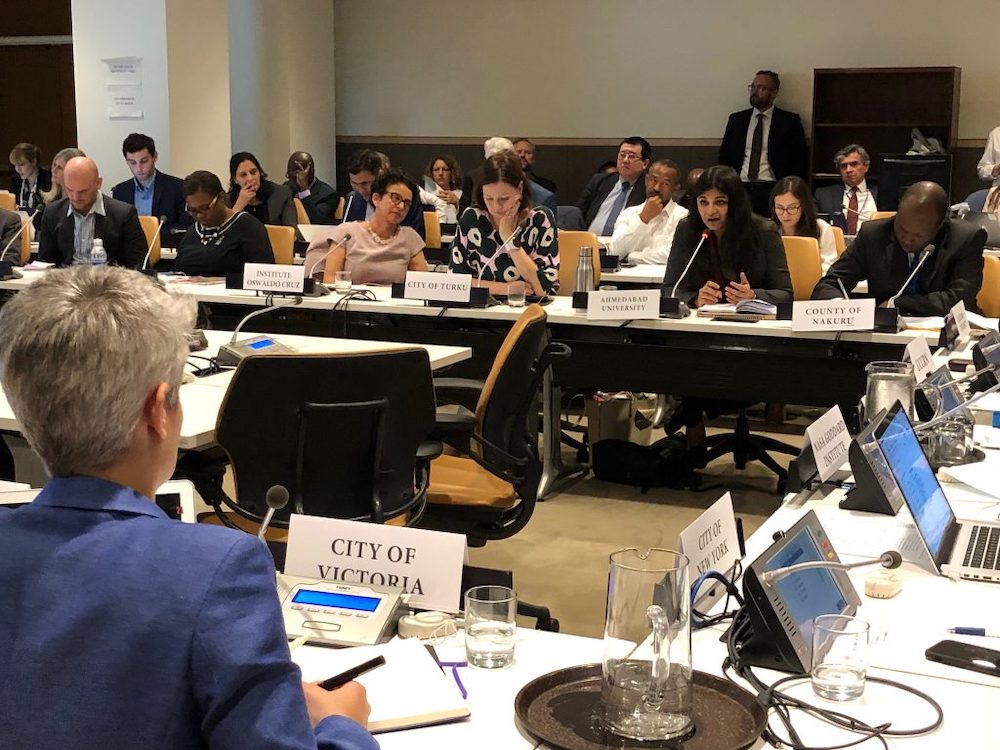UCCRN at UN Climate Action Summit
The Urban Climate Change Research Network (UCCRN) hosted an official side event at the UN Climate Action Summit, titled: Science for Cities: Actions towards 1.5°C from a Global Network of Scientists, Practitioners, and Decision-Makers’ on September 21 at UN Headquarters.
Andrew Revkin, Director of the Initiative on Communication Innovation & Impact at the Earth Institute, moderated the event, which included Gavin Schmidt, Director of the NASA Goddard Institute for Space Studies (NASA GISS) and Daniel Zarrilli, New York City’s Chief Climate Policy Advisor and the Director of OneNYC as Keynote Speakers.
Cynthia Rosenzweig and Bill Solecki, UCCRN Co-Directors led the event. On the panel were the Mayors of Turku, Finland; Victoria, British Columbia; Gov. of Nakuru County, Kenya; and the Executive Director of UN-Habitat, along with UCCRN expert scholars from the UCCRN African, South Asian, and Latin American Hubs and a representative from ICLEI-Local Governments for Sustainability. The event was organized by Somayya Ali Ibrahim, UCCRN Associate Director, and Danielle Manley, Staff Associate.



Summary of the UCCRN side event at the UN Climate Action Summit
By Aditya Bahadur, Fulbright Scholar, UCCRN
It is time to “unite behind the science” said Daniel Zarrilli, Director of the NYC Mayor’s Office of Recovery and Resiliency at the Science for 1.5°C Cities Event, an official side event at the landmark UN Secretary General’s Climate Action Summit 2019 convened by the Urban Climate Change Research Network (UCCRN). Mr. Zarrilli’s call for policy responses for enhancing climate action in cities based on the latest scientific data resonated with other prominent voices on the high-level panel that sought to bring together climate change experts with urban policy makers from across the world. Mayor Minna Arve of Turku, Finland stated that her city’s many climate change programs testify to the advantages of employing scientific knowledge in decision-making. The use of the latest science is also evident in her City’s Climate Plan 2029 that aims to work towards carbon neutrality by 2029 while simultaneously positioning the city’s as an international pioneer in providing urban climate solutions.
Another panelist, Maimunah Mohd Sharif, Executive Director of UN-Habitat underlined that knowledge and data needs to inform action, with products that contain accessible examples and case studies. Maryke Van Staden, Manager of the Low Emission Development Program at ICLEI, highlighted the need for “useful, multi-disciplinary knowledge products that can inform our leaders.” William Solecki, Co-Director of UCCRN, emphasized that this is the raison d’être of UCCRN’s Assessment Reports on Climate Change and Cities (ARC3) – with the online version of ARC3.2 launched at the event – that are seeing substantial uptake from urban governments and policy-makers across the world.
The panel also advocated for the proliferation of novel institutional mechanisms for effectively bridging the science-policy divide. Dan Zarrilli and Cynthia Rosenzweig highlighted that mechanisms such as the New York Panel on Climate Change (NPCC) can play a transformational role in ensuring that science is used for decision-making. Established in 2008, the NPCC brings leading scientists and urban policy-makers together to ensure that the best possible data and information are used for decision-making. Dan Zarilli said, “Everything we do in New York is informed by science, and the NPCC is the main mechanism that brings science we need right into the Mayor’s office.”
Panelists agreed on the fact that that a diversity of disciplines, not just the natural sciences, are critical for making progress on climate change in cities. Creating shifts towards more sustainable and climate-friendly urban lifestyles is dependent on understanding culture, behaviour, and social dynamics. Minal Pathak, Director of UCCRN’s South Asian Hub stressed that any new global initiative must explore the levers of behaviour change for enhancing adaptation and mitigation.
These discussions culminated in the consolidation of a consensus at event on the need for a global initiative to bridge the science-policy divide by linking research and action that tackles climate change across and within small, medium, and large cities. Voices from the audience argued that this new comprehensive initiative should embrace new information and communication technology including ‘big data’ approaches. These should complement data from existing instruments such as surveys, satellite remote sensing, climate models, and citizen science participatory approaches to provide precise, reliable, and granular understanding of each city’s hazards, exposure, and vulnerability to inform decision-making.
Mayor Lisa Helps from Victoria underlined the importance of using data for establishing baselines against which progress on tackling climate change can be effectively measured, and Maryke Van Staden emphasised the need for robust understanding of urban risks as well as for developing precise GHG inventories for cities. Cynthia Rosenzweig built on this to argue that “we need a massive scale-up in activities to enable science-city collaborations.”
The event ended on a lighter note where a participant from the floor added that while no one can deny the importance of robust science, more engaging approaches – even comedy – can also help bring about the change necessary for achieving urban climate action.
